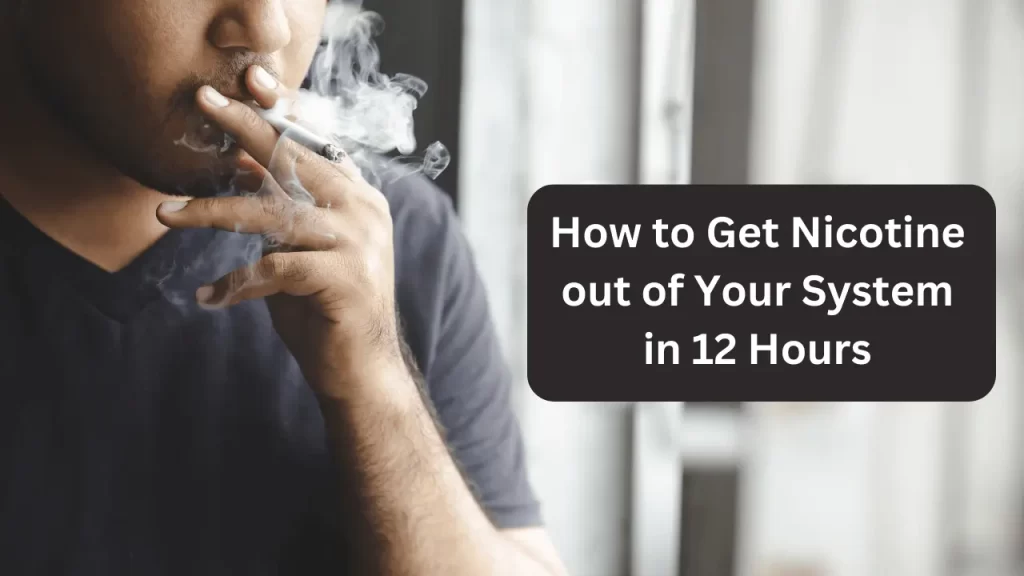
Nicotine is a highly addictive substance found in tobacco products, and breaking free from its grip can be a challenging journey. Whether you have a specific deadline or simply want to accelerate the process, learning how to get nicotine out of your system in 12 hours may seem like a daunting task. While the complete elimination of nicotine within such a short timeframe may not be feasible for everyone, there are strategies you can adopt to help reduce nicotine levels in your body.
In this article, we will explore various approaches, lifestyle changes, and tips to assist you in expediting the removal of nicotine from your system. It’s important to note that the effectiveness of these methods may vary depending on factors such as individual metabolism, the amount and frequency of nicotine use, and the sensitivity of testing methods. It’s always advisable to consult with a healthcare professional for personalized guidance and support.
Understanding the addictive nature of nicotine and the detrimental effects it can have on your health is the first step toward a nicotine-free life. By incorporating the strategies outlined in this article and committing to a smoke-free lifestyle, you can embark on a journey to reclaim your health and well-being. Remember, quitting nicotine is a process that requires determination, support, and patience, but the rewards are well worth the effort.
Understanding Nicotine and its Effects
Before delving into ways to remove nicotine from your system, it’s essential to understand what nicotine is and how it affects your body. Nicotine is a highly addictive substance found in tobacco products such as cigarettes, cigars, and chewing tobacco. When nicotine is consumed, it rapidly enters the bloodstream and reaches the brain, releasing neurotransmitters that create pleasurable sensations.
Nicotine addiction can have various adverse effects on your health, including increased heart rate, elevated blood pressure, reduced lung function, and an increased risk of cardiovascular diseases and certain types of cancers. Understanding the addictive nature and harmful impacts of nicotine can provide the motivation needed to take steps toward quitting.
How Long Does Nicotine Stay in Your System?
The duration that nicotine remains detectable in your system can vary depending on several factors, including the amount and frequency of nicotine use, the type of nicotine product used, individual metabolism, and the sensitivity of the testing method. Generally, nicotine can be detected in the body for several days, with its primary metabolite cotinine being detectable for a longer period.
In terms of the complete elimination of nicotine from your system, it’s important to note that removing nicotine entirely within a 12-hour timeframe may not be feasible for everyone. Nicotine can accumulate in the body over time, and its elimination depends on factors such as metabolism and the extent of nicotine use. However, adopting certain strategies can help in reducing nicotine levels in your body over time.
Read Also – How to Get Villagers to Restock
Importance of Quitting Nicotine
Quitting nicotine is crucial for your overall health and well-being. Here are some key reasons why it’s important to break free from nicotine addiction:
- Reduced health risks: Nicotine use is associated with numerous health risks, including lung diseases, heart conditions, cancers, and decreased immune function. By quitting nicotine, you significantly reduce the chances of developing these health problems and improve your overall longevity.
- Improved respiratory function: Nicotine and tobacco smoke can severely impact lung function and contribute to respiratory issues such as chronic bronchitis and emphysema. Quitting nicotine allows your lungs to heal and regain their normal function, leading to improved breathing and better overall respiratory health.
- Enhanced cardiovascular health: Nicotine constricts blood vessels and increases heart rate and blood pressure, putting extra strain on the cardiovascular system. Quitting nicotine reduces these risks and lowers the chances of developing heart diseases, strokes, and other cardiovascular complications.
- Better oral health: Nicotine use, particularly through smoking, can lead to oral health problems such as gum disease, tooth discoloration, and tooth loss. Quitting nicotine improves oral hygiene and decreases the risk of oral health issues.
- Financial savings: Nicotine addiction can be an expensive habit. Quitting nicotine not only benefits your health but also saves you money that can be used for other purposes or to improve your quality of life.
Understanding the importance of quitting nicotine can serve as a strong motivation to take steps toward a nicotine-free lifestyle. In the following sections, we will explore strategies and tips to help remove nicotine from your system and support your journey toward quitting.
Tips for Removing Nicotine from Your System
Nicotine can linger in your system for varying lengths of time, but there are several strategies you can employ to help speed up the process of eliminating nicotine from your body. While completely eliminating nicotine within a 12-hour timeframe may not be realistic for everyone, these tips can assist in reducing nicotine levels and supporting your journey towards a nicotine-free life.
Hydration and Flushing Toxins
Drinking plenty of water is an effective way to help flush toxins, including nicotine, from your body. Staying hydrated aids in the proper functioning of your organs, including the liver and kidneys, which play a significant role in detoxification. Aim to drink at least 8-10 glasses of water per day to support the elimination of nicotine and other harmful substances.
Exercise and Sweating
Engaging in physical activity can be beneficial for expediting the removal of nicotine from your system. Exercise not only boosts your metabolism but also promotes sweating, which aids in the elimination of toxins through the skin. Incorporate cardiovascular exercises, such as running, cycling, or swimming, into your routine to stimulate blood flow and increase perspiration.
Consuming Antioxidant-Rich Foods
Antioxidants help protect your body from the harmful effects of nicotine and aid in its elimination. Incorporate a variety of antioxidant-rich foods into your diet, such as fruits (berries, citrus fruits), vegetables (spinach, kale, broccoli), nuts, seeds, and green tea. These foods provide essential vitamins, minerals, and antioxidants that support your body’s natural detoxification processes.
Increasing Vitamin C Intake
Vitamin C is known for its detoxifying properties and can assist in eliminating nicotine from your system. Citrus fruits like oranges, lemons, and grapefruits are excellent sources of vitamin C. Consider incorporating these fruits into your diet or taking vitamin C supplements to support your body’s detoxification process.
Quitting Nicotine Products
The most effective way to eliminate nicotine from your system is to quit using nicotine products altogether. This includes cigarettes, e-cigarettes, cigars, and smokeless tobacco. Quitting nicotine is a challenging but crucial step in achieving a nicotine-free lifestyle. Consider seeking support from healthcare professionals, joining cessation programs, or using nicotine replacement therapies to help manage withdrawal symptoms and increase your chances of successfully quitting.
While these tips can assist in reducing nicotine levels in your system, it’s important to note that the exact timeframe for the complete elimination of nicotine may vary based on individual factors. Additionally, nicotine may still be detectable in certain tests even after it has been metabolized. If you have specific concerns or deadlines, it’s advisable to consult with a healthcare professional for personalized guidance and support.
By implementing these strategies, adopting a healthy lifestyle, and seeking the necessary support, you can take significant steps towards removing nicotine from your system and embarking on a nicotine-free journey of improved health and well-being.
Read Also – How to know if Someone Screenshots your Instagram Story
Timeframe for Nicotine Detoxification
Removing nicotine from your system is a process that takes time. While completely eliminating nicotine from your body within a 12-hour timeframe may not be feasible for everyone, the detoxification process can vary based on individual factors such as metabolism, the amount and frequency of nicotine use, and the sensitivity of testing methods.
On average, nicotine can remain detectable in the body for several days after use. However, the actual elimination of nicotine and its byproducts depends on various factors. It’s important to approach nicotine detoxification with realistic expectations and understand that it may take longer than 12 hours to completely rid your body of nicotine.
Seeking Professional Help and Support
Quitting nicotine can be challenging, and seeking professional help and support can greatly enhance your chances of success. Healthcare professionals, such as doctors or addiction specialists, can provide valuable guidance, personalized advice, and appropriate treatment options to support your journey toward a nicotine-free life.
There are various resources available to assist you in your quest to quit nicotine. Support groups, counseling services, and smoking cessation programs can provide a supportive community, coping strategies, and evidence-based techniques to help you overcome cravings and navigate the challenges of nicotine withdrawal. Remember, you don’t have to go through this process alone – reach out for the assistance you need.
Maintaining a Nicotine-Free Lifestyle
After successfully removing nicotine from your system, it’s crucial to maintain a nicotine-free lifestyle to avoid relapse. Here are some tips to help you stay on track:
- Identify triggers: Recognize situations, environments, or emotional states that may trigger cravings for nicotine. By identifying these triggers, you can develop strategies to cope with them effectively.
- Find healthy alternatives: Replace nicotine use with healthy habits and activities that provide a similar sense of relaxation or enjoyment. Engage in exercise, practice mindfulness or meditation, or pursue hobbies to occupy your time and keep your mind off nicotine.
- Build a support network: Surround yourself with supportive individuals who understand your goals and can provide encouragement during challenging times. Join support groups or connect with friends and family members who can offer guidance and accountability.
- Manage stress: Nicotine use is often associated with stress relief. Find healthy ways to manage stress, such as exercise, deep breathing exercises, or engaging in activities that bring you joy.
- Celebrate milestones: Celebrate your accomplishments along the way. Reward yourself for reaching milestones in your nicotine-free journey, whether it’s a week, a month, or a year without nicotine. Acknowledging your progress can boost your motivation and reinforce your commitment to a nicotine-free lifestyle.
Remember, quitting nicotine is a personal journey, and the path to success may vary for each individual. Be patient and kind to yourself throughout the process. With perseverance, support, and a commitment to maintaining a nicotine-free lifestyle, you can achieve your goal of living a healthier, smoke-free life.
Frequently Ask Questions FAQs
Q: Can nicotine be completely eliminated from the body within 12 hours?
A: Completely eliminating nicotine from the body within a 12-hour timeframe may not be feasible for everyone. The elimination of nicotine depends on various factors such as individual metabolism, the amount and frequency of nicotine use, and the sensitivity of testing methods.
Q: How long does nicotine stay in your system?
A: Nicotine can be detectable in the body for several days after use. However, the exact timeframe can vary based on factors such as the type of nicotine product used, individual metabolism, and the sensitivity of testing methods.
Q: Are there any quick methods to remove nicotine from the system within 12 hours?
A: While completely eliminating nicotine from the body within 12 hours may not be realistic, there are strategies that can help reduce nicotine levels. Hydration, exercise, consuming antioxidant-rich foods, and quitting nicotine products are some approaches that may assist in the detoxification process.
Q: Can drinking water help flush out nicotine from the system?
A: Staying hydrated by drinking plenty of water is beneficial for overall health and may aid in flushing toxins from the body, including nicotine. However, it’s important to note that water alone cannot instantly remove nicotine from the system.
Q: Does exercise help in getting nicotine out of the system?
A: Engaging in physical activity, such as exercise, can promote blood circulation and sweating, which may aid in the elimination of toxins, including nicotine, through the skin. Exercise can also contribute to overall health and well-being.

Hi I’m Rajat, I love to read and write articles. I love to write content on different topics on behalf of different companies.
